Items filtered by date: January 2023
Heel Pain May Indicate Plantar Fasciitis
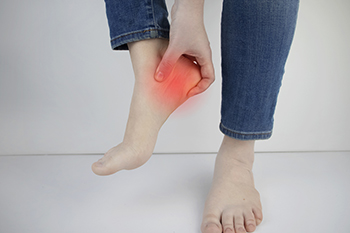
Plantar fasciitis is a foot condition that affects the heel. The pain may begin as a dull ache and gradually increase to become extremely uncomfortable. Plantar fasciitis is the inflammation of the plantar fascia, which is the portion of tissue found on the bottom of the foot connecting the heel to the toes. There are various reasons why the plantar fascia becomes inflamed, such as wearing shoes that do not fit correctly and standing on hard surfaces for most of the day. Runners often experience plantar fasciitis due to the repetitive motion that is required. People who are overweight or pregnant may also be prone to developing this condition, in addition to those with high arches or flat feet. The pain from plantar fasciitis may be worse in the morning upon arising, or after sitting for an extended period. Plantar fasciitis is a condition that is treated by a podiatrist, and it is strongly suggested that you schedule an appointment for a proper diagnosis and effective treatment plan.
Plantar fasciitis can be very painful and inconvenient. If you are experiencing heel pain or symptoms of plantar fasciitis, contact one of our podiatrists from Nashville Family Foot Care. Our practitioners can provide the care you need to keep you pain-free and on your feet.
What Is Plantar Fasciitis?
Plantar fasciitis is the inflammation of the thick band of tissue that runs along the bottom of your foot, known as the plantar fascia, and causes mild to severe heel pain.
What Causes Plantar Fasciitis?
- Excessive running
- Non-supportive shoes
- Overpronation
- Repeated stretching and tearing of the plantar fascia
How Can It Be Treated?
- Conservative measures – anti-inflammatories, ice packs, stretching exercises, physical therapy, orthotic devices
- Shockwave therapy – sound waves are sent to the affected area to facilitate healing and are usually used for chronic cases of plantar fasciitis
- Surgery – usually only used as a last resort when all else fails. The plantar fascia can be surgically detached from the heel
While very treatable, plantar fasciitis is definitely not something that should be ignored. Especially in severe cases, speaking to your doctor right away is highly recommended to avoid complications and severe heel pain. Your podiatrist can work with you to provide the appropriate treatment options tailored to your condition.
If you have any questions please feel free to contact our office located in Nashville, TN . We offer the newest diagnostic and treatment technologies for all your foot and ankle needs.
Let the Expert Treat Your Ingrown Toenails
Various Reasons Why Wounds Develop on the Feet
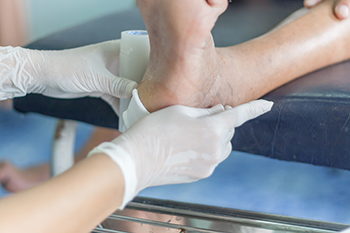
An injury that breaks through the skin is called a wound. Small wounds on the feet may heal naturally whereas larger and deeper wounds may require assistance. After the hands are thoroughly washed, pressure can be applied to stop existing bleeding. This is generally followed by cleaning the wound with water and saline solution and removing any foreign objects from it. Many times an antibiotic cream is applied to it to help prevent an infection from developing. A dressing is then put over it and changed daily to ensure the wound is kept clean. Wounds can develop for various reasons and generally require prompt medical attention. Wounds can occur due to a human or animal bite, an injury, or getting cut by a dirty or rusty object. Additionally, if there is blood coming from the wound that cannot be stopped, it is strongly urged to contact a podiatrist who can effectively treat wounds on the feet.
Wound care is an important part in dealing with diabetes. If you have diabetes and a foot wound or would like more information about wound care for diabetics, consult with one of our podiatrists from Nashville Family Foot Care. Our practitioners will assess your condition and provide you with quality foot and ankle treatment.
What Is Wound Care?
Wound care is the practice of taking proper care of a wound. This can range from the smallest to the largest of wounds. While everyone can benefit from proper wound care, it is much more important for diabetics. Diabetics often suffer from poor blood circulation which causes wounds to heal much slower than they would in a non-diabetic.
What Is the Importance of Wound Care?
While it may not seem apparent with small ulcers on the foot, for diabetics, any size ulcer can become infected. Diabetics often also suffer from neuropathy, or nerve loss. This means they might not even feel when they have an ulcer on their foot. If the wound becomes severely infected, amputation may be necessary. Therefore, it is of the upmost importance to properly care for any and all foot wounds.
How to Care for Wounds
The best way to care for foot wounds is to prevent them. For diabetics, this means daily inspections of the feet for any signs of abnormalities or ulcers. It is also recommended to see a podiatrist several times a year for a foot inspection. If you do have an ulcer, run the wound under water to clear dirt from the wound; then apply antibiotic ointment to the wound and cover with a bandage. Bandages should be changed daily and keeping pressure off the wound is smart. It is advised to see a podiatrist, who can keep an eye on it.
If you have any questions, please feel free to contact our office located in Nashville, TN . We offer the newest diagnostic and treatment technologies for all your foot care needs.
Effects of Aging on the Feet
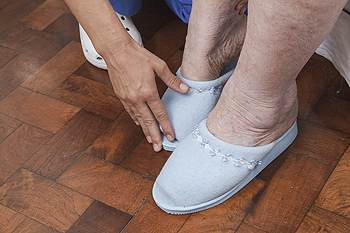
The older the foot, the less spring in your step. Because the feet are involved in most of the activities you do throughout your life, they begin to wear out as you age. Natural changes that result from aging are thinning of the skin, joint wear and tear, and decreased muscle strength. Further, the blood or nerve supply to the feet may diminish, and the bones may become more brittle due to osteoporosis, especially in seniors with peripheral artery disease, diabetes, arthritis, or neuropathy. Fat pads in the heels become thinner, which results in heel pain, and joints become less able to withstand impact. Arthritis and wear and tear of the foot are more likely if you have experienced severe foot trauma, overuse from sports or other physical activities, osteoarthritis, or rheumatoid arthritis. Arches may drop, causing flattening of the feet, which adds to the likelihood of arch pain. One way that helps to overcome many of these changes is finding footwear that provides ample arch support and cushioning for tired feet. For more information on dealing with increased causes of foot pain as you age, please consult a podiatrist.
Proper foot care is something many older adults forget to consider. If you have any concerns about your feet and ankles, contact one of our podiatrists from Nashville Family Foot Care. Our practitioners can provide the care you need to keep you pain-free and on your feet.
The Elderly and Their Feet
As we age we start to notice many changes in our body, but the elder population may not notice them right away. Medical conditions may prevent the elderly to take notice of their foot health right away. Poor vision is a lead contributor to not taking action for the elderly.
Common Conditions
- Neuropathy – can reduce feeling in the feet and can hide many life-threatening medical conditions.
- Reduced flexibility – prevents the ability of proper toenail trimming, and foot cleaning. If left untreated, it may lead to further medical issues.
- Foot sores – amongst the older population can be serious before they are discovered. Some of the problematic conditions they may face are:
- Gouging toenails affecting nearby toe
- Shoes that don’t fit properly
- Pressure sores
- Loss of circulation in legs & feet
- Edema & swelling of feet and ankles
Susceptible Infections
Diabetes and poor circulation can cause general loss of sensitivity over the years, turning a simple cut into a serious issue.
If you have any questions please feel free to contact our office located in Nashville, TN . We offer the newest diagnostic and treatment technologies for all your foot and ankle needs.
Healing Diabetic Foot Ulcers
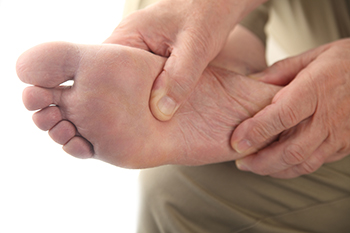
Diabetic foot ulcers are difficult wounds to heal. The size of the ulcer, gender, and potential infection have been linked to healing time. Larger ulcers and infections tend to lead to longer wound closure times, and men tend to have slower healing time for wounds. One way to have a positive effect on wound healing is by making sure glucose levels are within normal range. It is particularly important for diabetics to examine their feet daily to check for cuts and scrapes that can lead to ulcers. If you have diabetes, it is suggested that you include a podiatrist on your health care team and get your feet checked regularly.
Diabetic foot care is important in preventing foot ailments such as ulcers. If you are suffering from diabetes or have any other concerns about your feet, contact one of our podiatrists from Nashville Family Foot Care. Our practitioners can provide the care you need to keep you pain-free and on your feet.
Diabetic Foot Care
Diabetes affects millions of people every year. The condition can damage blood vessels in many parts of the body, especially the feet. Because of this, taking care of your feet is essential if you have diabetes, and having a podiatrist help monitor your foot health is highly recommended.
The Importance of Caring for Your Feet
- Routinely inspect your feet for bruises or sores.
- Wear socks that fit your feet comfortably.
- Wear comfortable shoes that provide adequate support.
Patients with diabetes should have their doctor monitor their blood levels, as blood sugar levels play such a huge role in diabetic care. Monitoring these levels on a regular basis is highly advised.
It is always best to inform your healthcare professional of any concerns you may have regarding your feet, especially for diabetic patients. Early treatment and routine foot examinations are keys to maintaining proper health, especially because severe complications can arise if proper treatment is not applied.
If you have any questions please feel free to contact our office located in Nashville, TN . We offer the newest diagnostic and treatment technologies for all your foot and ankle needs.
Hammertoe and Orthotics
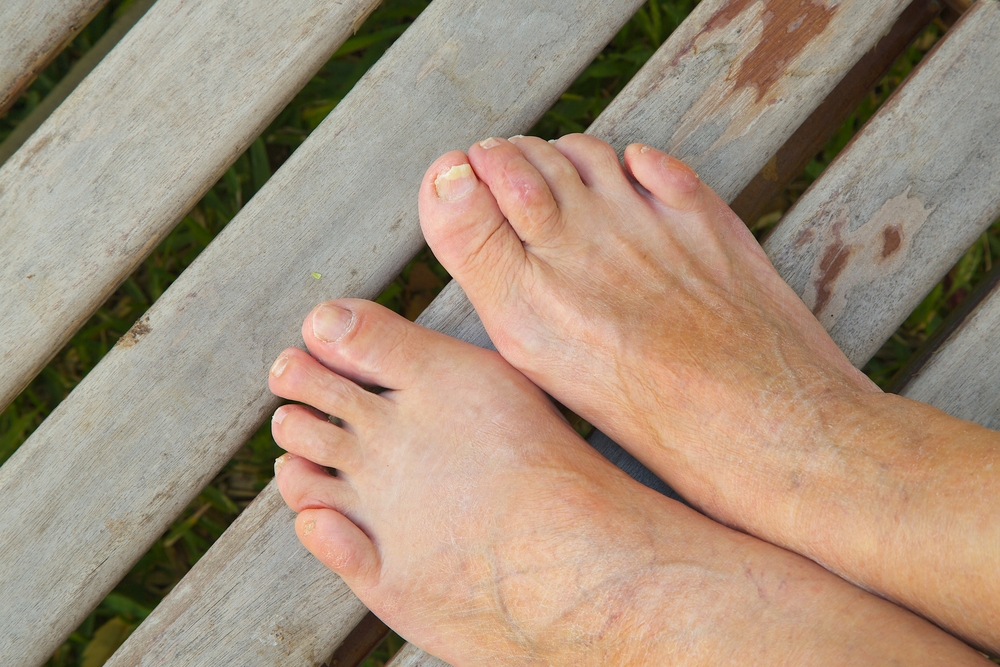
A hammertoe is a condition that makes the toe point upwards at the joint in an unnatural way. As a result, the toe resembles a hammer. There are several ways that a medical professional might go about helping you correct this deformity. Orthotics can play an important role in the correction process. Orthotics are special inserts that can be either custom-made or one-size-fits-all, and they can help people correct deformities or their gait. A medical professional might recommend the use of orthotics for hammertoes. One specific kind of orthotic for hammertoes is known as a hammer toe crest pad. The hammertoe is essentially held in place by this pad, which is positioned underneath the toes. The crest pad resembles a kind of ring that goes around the hammertoe. This device is meant to support and mitigate the hammertoe condition. If you are afflicted with hammertoe and think that you might be a good candidate for orthotics, consult a podiatrist today for more information.
Hammertoe
Hammertoes can be a painful condition to live with. For more information, contact one of our podiatrists from Nashville Family Foot Care. Our practitioners will answer any of your foot- and ankle-related questions.
Hammertoe is a foot deformity that affects the joints of the second, third, fourth, or fifth toes of your feet. It is a painful foot condition in which these toes curl and arch up, which can often lead to pain when wearing footwear.
Symptoms
- Pain in the affected toes
- Development of corns or calluses due to friction
- Inflammation
- Redness
- Contracture of the toes
Causes
Genetics – People who are genetically predisposed to hammertoe are often more susceptible
Arthritis – Because arthritis affects the joints in your toes, further deformities stemming from arthritis can occur
Trauma – Direct trauma to the toes could potentially lead to hammertoe
Ill-fitting shoes – Undue pressure on the front of the toes from ill-fitting shoes can potentially lead to the development of hammertoe
Treatment
Orthotics – Custom made inserts can be used to help relieve pressure placed on the toes and therefore relieve some of the pain associated with it
Medications – Oral medications such as anti-inflammatories or NSAIDs could be used to treat the pain and inflammation hammertoes causes. Injections of corticosteroids are also sometimes used
Surgery – In more severe cases where the hammertoes have become more rigid, foot surgery is a potential option
If you have any questions please contact our office located in Nashville, TN . We offer the newest diagnostic and treatment technologies for all your foot and ankle needs.

